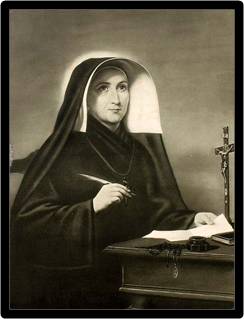AUGUST 26 - ST. ELIZABETH BICHIER

Elizabeth was born in France and came from a very good family. Then during the time of the French Revolution, Elizabeth’s family lost everything they owned. This was because the republicans were taking property from the nobility.
But this intelligent young woman of nineteen studied law so she could fight her family’s case in court. Being a good lawyer, she won the case and was able to save her family. The village shoemaker exclaimed: “All you have to do now is marry a good republican!”
But Elizabeth had no intention of marrying anyone republican or noble. On the back of a picture of Our Lady, she had written: “I dedicate and consecrate myself to Jesus and Mary forever.”
Elizabeth soon joined the convent and became a nun, with the help of St. Andrew Fournet, she started a new religious order called the Daughters of the Cross.
As a little girl, her favorite game was building castles in the sand. Many years later, this holy French woman had to take charge of building many convents for the Daughters of the Cross. “I guess building was meant to be my business,” she joked, “since I started it so young!”
This new order taught children and cared for the sick. Elizabeth would face any danger to help people. Once she found a tramp lying sick in a barn. She brought him to the convent hospital and did all she could for him until he died. The next morning the police chief came to tell her she could be arrested for sheltering a man who was a criminal.
Elizabeth was unafraid. “I only did what you yourself would have done, sir,” she said. “I found this poor sick man, and took care of him until he died. I am ready to tell the judge just what happened.”
` Of course, the saint’s honesty and charity won her great respect. People admired her straight, clear answers. By 1830, Elizabeth had opened over sixty convents.
The order’s co-founder, St. Andrew Fournet, died in 1834. St. Elizabeth wrote to the sisters, “This is our greatest and most sad loss.” Then four years later St. Elizabeth died on August 26, 1838.
